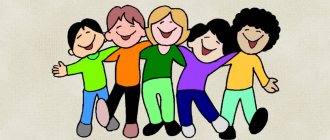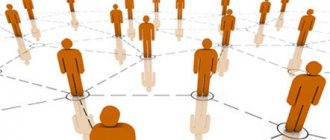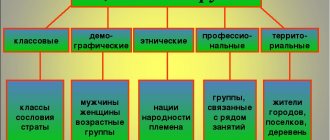Erich Fromm, the creator of humanistic psychoanalysis, gave the world many noteworthy works. In this note we will consider the typology of character according to Fromm. Let's start with what distinguishes us from animals and what problems this brings us. Unlike animals, we adapt less well to the environment. It follows that we are more helpless than them. This disadvantage also has its advantages; it gives impetus to the development of our human qualities.
Reason gives an advantage over animals, and it also creates a lot of problems. The ability to think has endowed us with boredom, dissatisfaction and worry.
The most fundamental existential dichotomy, writes E. Fromm, is the dichotomy between life and death. Understanding the inevitability of the end has a deep impact on us, which can be both positive and negative.
A person can try to get rid of internal anxiety, says Erich Fromm, by immersing himself in entertainment or some business. Dale Carnegie advises the same thing to get rid of obsessive thoughts and worries. The meaning of life lies in discovering one’s abilities through creative or productive life. To do this, a person rushes to love, then to power, then to something else.
Hippocrates distinguished four types of temperament: choleric, sanguine, phlegmatic and melancholic. Temperament, unlike character, is unchangeable. Character is formed under the influence of the social environment and life experiences of the individual. Erich Fromm identifies 5 character types, which are divided into two groups: productive and unproductive. He considers unproductive (unhealthy) social types of character: receptive, exploitative, accumulative and market.
Receptive character type
People with this character believe that everything they want can be obtained from the outside. In love, they try to be loved, not to love, and therefore they give themselves to anyone who will give them this feeling. They can be excellent listeners, because people with this type of character are only capable of absorbing ideas and not of developing them. They are inclined to look for people who will give them the information they need and will not put in an iota of effort to find it themselves. It is also difficult for receptive types to say “no” due to their dependence on others. Loneliness is not for them, because without the help of others they are powerless. This type can be combined with helplessness in making decisions and unwillingness to take responsibility. These people love to eat and drink well, especially to cope with anxiety and stress.
Despite all the shortcomings of the receptive character type, people with this type are quite optimistic and friendly. They can sincerely help others only if they, in turn, provide mutual support.
Exploitative character type
Just like a receptive individual is incapable of creativity. If they need something, they take it by force. Exploiters undervalue what they own, and the things of others seem more important to them. Such people are aggressive, selfish, arrogant and arrogant. They are sarcastic towards others. Relationships are viewed from the perspective of benefits for themselves, and they also try to manipulate. People with the exploitative type are cynical and envious.
Despite all the shortcomings of the exploitative character type, people with this type are self-confident, self-respecting and impulsive (the latter quality cannot always be considered positive).
Types of the nervous system. Strong and weak type
Published: 12/20/2018
We all behave differently in difficult situations, work at different paces, and react to criticism. These differences are largely due to the type of nervous system. The type of nervous system can be strong or weak, inert or mobile, balanced and unbalanced. The characteristics of the nervous system determine the known types of temperament: choleric, sanguine, phlegmatic, melancholic. According to I.P. Pavlov, the strength of the nervous system is...
no comments yet
Accumulative character type
Unlike the previous two types, Accumulators act in the opposite way. They are afraid of new things. They try to accumulate and save as much as possible, and any costs break their peace of mind. People with the hoarding type are stingy not only with money, but also with emotions and feelings. They may know a lot, but they usually store only this information and do not use it to produce ideas. They are laconic, and their gestures betray isolation. Hoarders have order everywhere, they are clean and stubborn. Representatives of the accumulative type of character are rigid, i.e. have constant interests, inflexible, wanting to be first everywhere, pedantic and straightforward.
Despite all the shortcomings of the accumulative type of character, people with this type are benevolent, restrained and prudent.
Personality typology according to V. I. Zatsepin
Published: 09/29/2018
Our former compatriot, now living in Australia, summarizing Western literary data, gives a description of eight basic, from his point of view, personality types: infantile; authoritarian; Machiavellian; accumulative; adventurous; flexible; altruistic; creative (Zatsepin, 2002). Infantile The infantile personality type (psychopath) is characterized by social underdevelopment: dishonesty and lack of empathy. People of this type are quiet, polite, courteous, even charming and at the same time...
no comments yet
Productive character type
He's a healthy guy. Fromm cited this type as something that everyone should strive for. A productive character is associated with calmness, love, and socially useful actions. Erich Fromm believes that everyone who does not have mental disabilities is capable of productivity. And, despite all the mundane requirements for this type of character, it remains ideal and rarely encountered in real life.
In this note we looked at the types of characters according to Fromm. To better understand yourself and others, knowledge of this issue is necessary, because character is an incentive to certain actions, and it also makes people think in a certain way.
Typology of characters (E. Fromm, K. Horney).
Fromm identified five social character types that prevail in modern societies. These social types, or forms of establishing relationships with others, represent the interaction of existential needs and the social context in which people live. Fromm divided them into two large classes: unproductive (unhealthy) and productive (healthy) types . The category of unproductive ones includes receptive, exploiting, accumulating and market types of character. The category productive represents the type of ideal mental health in Fromm’s understanding. Fromm noted that none of these character types exists in a pure form, since unproductive and productive qualities are combined in different people in different proportions. Consequently, the influence of a given social character type on mental health or illness depends on the ratio of positive and negative traits manifested in the individual.
Receptive types
Receptive types are convinced that the source of everything good in life is outside themselves. They are openly dependent and passive, unable to do anything without help, and think that their main task in life is to be loved rather than to love. Receptive individuals can be characterized as passive, trusting and sentimental. In extremes, people with a receptive orientation can be optimistic and idealistic.
Operating types
Exploitative types take whatever they need or dream of through force or ingenuity. They are also incapable of creativity, and therefore they achieve love, possession, ideas and emotions by borrowing all this from others. The negative traits of an exploitative character are aggressiveness, arrogance and self-confidence, self-centeredness and a tendency to seduce. Positive qualities include self-confidence, self-esteem and impulsiveness.
Accumulating types
Accumulating types try to possess as much material wealth, power and love as possible; they strive to avoid any attempts on their savings. Unlike the first two types, “hoarders” gravitate toward the past and are scared off by everything new. They resemble Freud's anal-retentive personality: rigid, suspicious and stubborn. According to Fromm, they also have some positive characteristics - foresight, loyalty and restraint.
Market type
The market type is based on the belief that personality is valued as a commodity that can be sold or profitably exchanged. These people are interested in maintaining a good appearance, meeting the right people, and are willing to demonstrate any personality trait that would increase their chances of success in selling themselves to potential customers. Their relationships with others are superficial, their motto is “I am what you want me to be.”
In addition to being extremely aloof, market orientation can be described by the following key personality traits: opportunistic, aimless, tactless, unscrupulous, and empty-handed. Their positive qualities are openness, curiosity and generosity. Fromm viewed the “market” personality as a product of modern capitalist society, formed in the USA and Western European countries.
Productive character
In contrast to unproductive orientation, productive character represents, from Fromm’s point of view, the ultimate goal in human development. This type is independent, honest, calm, loving, creative and performs socially useful actions. From Fromm's work it is clear that he viewed this orientation as a response to the contradictions of human existence inherent in society. It reveals a person’s ability for productive logical thinking, love and work. Through productive thinking, people learn who they are and therefore free themselves from self-deception. The power of productive love makes it possible for people to passionately love all life on Earth (biophilia). Fromm defined biophilia in terms of caring, responsibility, respect, and knowledge. Finally, productive work provides the ability to produce the necessities of life through creative self-expression. The result of the implementation of all the above forces, which are characteristic of all people, is a mature and holistic character structure.
According to Horney:
1. Compliant type (moving towards people). People of this type, according to Horney, are distinguished by a pronounced need for love and approval and have a special need for a “partner”, i.e. in a friend, lover, wife or husband. These needs in neurotics are obsessive, lack selectivity, and cause anxiety or depression in case of frustration. A neurotic person strives to persistently fulfill his needs, regardless of what people he appeals to, whether or not these people have a corresponding feeling for him. The main thing here is to “belong to someone” at any cost. Hence the over-compliance, attentiveness, over-trusting of others, the conviction that they are all beautiful and that he loves them all. This is also associated with such qualities as the desire to get away from quarrels, unkind views, competition, avoidance of leading roles, complaisance, a dominant feeling of weakness and helplessness, a feeling of inferiority, evaluating oneself in the opinion of others, fear of criticism in one’s address, masochistic tendencies and etc.
2. Aggressive type (movement against people). People of this type are dominated by aggressive tendencies. If the compliant type is inclined to fanatically consider all people to be good, then this type, on the contrary, sees ill-wishers in all his acquaintances. Hence, reality is perceived as a struggle between everyone and everyone. Sometimes aggressiveness is masked by external courtesy and goodwill. These people are characterized by the need to control others, the achievement of power, a feeling of superiority over others, prestige, recognition, cruelty, intransigence, lack of self-criticism, the desire to fight, to argue, to demonstrate their wrestling abilities. These people reject outer expressions of love, affection, sensitivity, compassion, etc.
3. Isolated (detached) type. (movement from people). For people of this type, typical desires to avoid communication with people, self-alienation (insensitive to emotional inner experiences), and the need for self-sufficiency are typical. These people can sometimes spend an evening with a few friends, but do not tolerate a wide circle of friends. They strive for solitude, including eating, working, sleeping alone, avoiding competition and struggle, and are concerned with achieving their complete independence, their superiority and their uniqueness. The attitude of detachment in neurotics, according to Horney, “represents the most radical and most effective of defenses.”
Thus, all types of neurotics are characterized by pronounced rigidity, inflexibility in behavior, and an irresistible desire (“at any cost”) to satisfy their needs. These forms of psychological defense allow neurotics to some extent relieve the basal state of anxiety and adapt to the situation, but, in essence, this is pseudo-adaptation. In the case of serious obstacles that make it impossible to satisfy needs, anxiety in neurotics intensifies until a state of panic occurs.










